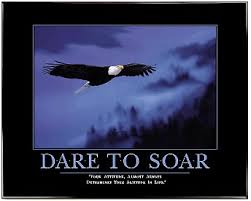TEAM BUILDING ACTIVITY: Create your own motivational posters
We've all seen the incredibly ubiquitous line of 'Successories' posters that have graced workplaces all over the world in the last ten years or so. You know the classic high resolution shots of mountains or a crew team rowing on a picturesque river or a graceful eagle soaring above a beautiful valley.
These images are accompanied by inspiring maxims or slogans with words like 'Perserverance', 'Focus', or 'Trust'. These posters, (a classic example of one is on the right), are terrible.
They are terrible not in that we shouldn't try to find sources of motivation and inspiration, especially at work, but that they don't offer any meaningful or applicable insight into how we can actually become more motivated or engaged. 'A team is only as strong as it's weakest member' probably isn't going to motivate everyone on the team to get better. It will, likely, make everyone perform a quick mental exercise attempting to identify the actual weakest link and a scheme to get that weakest link kicked off the team (or fired).
I thought about these Successories posters not from catching one in the service center customer waiting room at the Chevy dealer, (although I am pretty sure there is one there), but from catching this piece on Laughing Squid - An Amusing Line of Self-Defeating Motivational Posters That Quote Morrissey Lyrics as a Source of Inspiration. These posters, sharing the same kinds of imagery as the Successories posters, are of course awesome. Drop a Morrissey lyric like "There are brighter sides to life and I should know, because I've seen them - but not very often" over a backdrop of a gorgeous blue ocean and you have an unmitigated win.
The Morrissey inspirational posters are fun, but I doubt, just like the inane Successories posters that you would actually get any value from tacking them up on the break room wall. But what I think would be fun, and perhaps even a little instructive in a way, is to have your staffs create their own versions of the Successories gimmick using the same kinds of stock images, but having the employees write their own taglines and calls to action that would be more relevant to your specific organization.
I will even get you started, (feel free to add your caption, slugline in the comments), with the classic 'Rowers' image sans the good folks at Successories (or Morrissey), telling you what to think about it.

What do you have?
I might go with 'CONFORMITY: If we all wear the same outfits we will be sure to head in the same direction (let's hope it's the right one)'

 Steve
Steve


